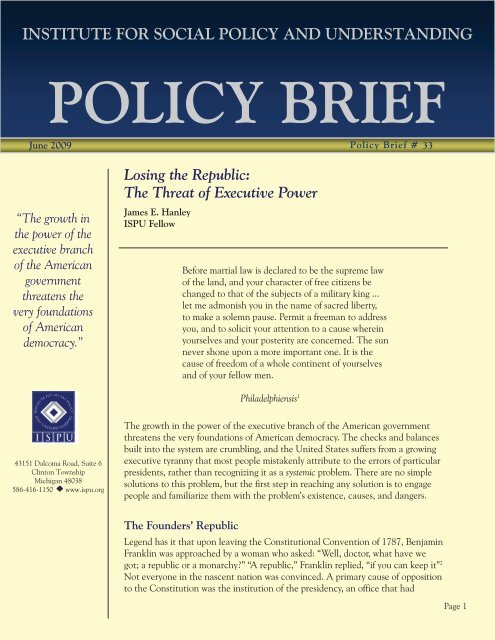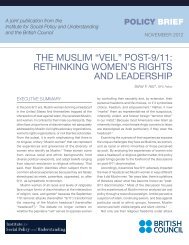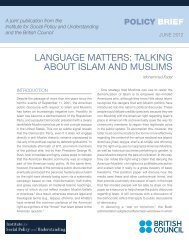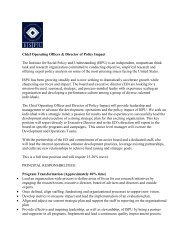Policy Brief Template.indd - Institute for Social Policy and ...
Policy Brief Template.indd - Institute for Social Policy and ...
Policy Brief Template.indd - Institute for Social Policy and ...
You also want an ePaper? Increase the reach of your titles
YUMPU automatically turns print PDFs into web optimized ePapers that Google loves.
INSTITUTE FOR SOCIAL POLICY AND UNDERSTANDINGPOLICY BRIEFJune 2009“The growth inthe power of theexecutive branchof the Americangovernmentthreatens thevery foundationsof Americ<strong>and</strong>emocracy.”Losing the Republic:The Threat of Executive PowerJames E. HanleyISPU Fellow<strong>Policy</strong> <strong>Brief</strong> #Be<strong>for</strong>e martial law is declared to be the supreme lawof the l<strong>and</strong>, <strong>and</strong> your character of free citizens bechanged to that of the subjects of a military king ...let me admonish you in the name of sacred liberty,to make a solemn pause. Permit a freeman to addressyou, <strong>and</strong> to solicit your attention to a cause whereinyourselves <strong>and</strong> your posterity are concerned. The sunnever shone upon a more important one. It is thecause of freedom of a whole continent of yourselves<strong>and</strong> of your fellow men.Philadelphiensis 13343151 Dalcoma Road, Suite 6Clinton TownshipMichigan 48038586-416-1150 www.ispu.orgThe growth in the power of the executive branch of the American governmentthreatens the very foundations of American democracy. The checks <strong>and</strong> balancesbuilt into the system are crumbling, <strong>and</strong> the United States suffers from a growingexecutive tyranny that most people mistakenly attribute to the errors of particularpresidents, rather than recognizing it as a systemic problem. There are no simplesolutions to this problem, but the first step in reaching any solution is to engagepeople <strong>and</strong> familiarize them with the problem’s existence, causes, <strong>and</strong> dangers.The Founders’ RepublicLegend has it that upon leaving the Constitutional Convention of 1787, BenjaminFranklin was approached by a woman who asked: “Well, doctor, what have wegot; a republic or a monarchy?” “A republic,” Franklin replied, “if you can keep it” 2Not everyone in the nascent nation was convinced. A primary cause of oppositionto the Constitution was the institution of the presidency, an office that hadPage 1
2[Type text]INSTITUTE FOR SOCIAL POLICY AND UNDERSTANDINGPOLICY BRIEFmore egregious than any of the decisions by post-World War II presidents to insert troops intoconflicts without a declaration of war. None of those many cases, however, including our militaryengagements in Korea, Vietnam, Cambodia, Grenada, Panama, Iraq, <strong>and</strong> Yugoslavia, has resultedin a congressional censure. What was seen as unconstitutional in 1846 is seen as normal today.The Imperial PresidencyThe primary area of danger is the presidents’ exercise of their powers in <strong>for</strong>eign policy. Hamiltonclearly recognized the threat to liberty caused by national security issues more than 200 years ago:Safety from external danger is the most powerful director of national conduct.Even the ardent lover of liberty will, after a time, give way to its dictates. Theviolent destruction of life <strong>and</strong> liberty incident to war, the continual ef<strong>for</strong>t <strong>and</strong>alarm attendant on a state of continual danger, will compel nations the mostattached to liberty to resort <strong>for</strong> repose <strong>and</strong> security to institutions which have atendency to destroy their civil <strong>and</strong> political rights. To be more safe, they at lengthbecome willing to run the risk of being less free. 7Today we live in a national security state — a state in which the president st<strong>and</strong>s supreme in anypolicy issue that can be at least plausibly, <strong>and</strong> sometimes only implausibly, defined as affectingnational security.The threat has been growing throughout the past century, ever since the United States firstbecame an empire by winning the Spanish-American war <strong>and</strong> taking Cuba, Puerto Rico, <strong>and</strong> thePhilippines as colonies. However it has accelerated since the 1960s.• In 1964 Lyndon Johnson lied to the American public about the Gulf of Tonkin incident inorder to obtain congressional support <strong>for</strong> exp<strong>and</strong>ing a war that would ultimately cost over50,000 American lives in a losing ef<strong>for</strong>t;• In 1972 Richard Nixon tried to subvert democracy by literally stealing a presidentialelection <strong>and</strong> then tried to subvert justice by having the CIA interfere with the FBI’s legalinvestigation by making a false claim of national security;• In the 1980s a cadre of National Security Council operatives in the Reaganadministration undermined the rule of law <strong>and</strong> separation of powers by illegally sellingweapons to Iran (although Iran had occupied the American embassy in Tehran <strong>and</strong> heldAmerican diplomats hostage <strong>for</strong> over a year) with the intent of using Iran to influenceHezbollah, which was holding American hostages in Lebanon, <strong>and</strong> then illegally funnelingthe money from the weapons sales, which by law should have gone to the U.S. Treasury,to the Contra rebels in Nicaragua in spite of a law banning the use of federal funds tosupport them;• Ronald Reagan ordered the invasion of Grenada not only without congressionalauthorization, but also without any congressional consultation;Page 3
2[Type text]INSTITUTE FOR SOCIAL POLICY AND UNDERSTANDINGPOLICY BRIEFFirst, much of the public does not yet recognize the danger, because the growth in power hasbeen so steady. In other words, the leaps have not been noticeable enough to catch the public’sattention. A graphic explanation is helpful here. Figure 1 illustrates how executive power, at acertain point (a step-function), increases suddenly. In this case, public attention would be drawnto that increase <strong>and</strong> a political reaction might ensue.Figure 1: Step-Function Growth in Executive Power over TimeFigure 2 shows a case where the increase is gradual, but nonetheless increasing, without anysudden change to attract the public’s attention. In this case, the growth in power is just as greatbut occurs in a way that does not cause significant alarm <strong>and</strong> attention.Figure 2: Steady Increase in Executive Power over TimeIt would seem that we have had many warning moments in which presidential power seemed toincrease suddenly — Watergate <strong>and</strong> Iran-Contra, <strong>for</strong> example — <strong>and</strong> yet the public has not yettaken notice of this ongoing phenomenon. In those cases, however, the public was lulled intothinking that the crisis was over because Nixon resigned <strong>and</strong> Reagan publicly admitted the Iran-Contra events. And this lulling of the public consciousness works synergistically with the secondreason <strong>for</strong> the public’s lack of concern: our faith in democratic accountability.Our ability to “vote the bums” out if we catch them in misdeeds leads us to believe that thedangers inhere in the individual person who holds the office. If that is the case, then we canvote out the bad person <strong>and</strong> vote in a good person. But democratic accountability no longerfunctionally exists in presidential politics because, ironically, of the increasing democratizationof the presidential selection process. As the presidency has increasingly become “the people’stribune,” its justification <strong>for</strong> extending executive power has grown along with the c<strong>and</strong>idates’ambition.Page 6
2[Type text]INSTITUTE FOR SOCIAL POLICY AND UNDERSTANDINGPOLICY BRIEFmembers dem<strong>and</strong>ed the right to participate in selecting their party’s c<strong>and</strong>idate. But in both thecaucus <strong>and</strong> convention systems, c<strong>and</strong>idates could not effectively run <strong>for</strong> the nomination on theirown; instead, they had to wait <strong>for</strong> their party to call them. Anyone aggressive enough to run hard<strong>for</strong> the nomination was sure to step on the toes of other influential persons who would then dotheir best to block the nomination. This is why there were so many “dark horse” c<strong>and</strong>idates inthe nineteenth century. Political scientists Matthew Crenson <strong>and</strong> Benjamin Ginsberg, in theirimportant Presidential Power: Unchecked <strong>and</strong> Unbalanced, describe the c<strong>and</strong>idate selection politicsof the era:The parties had developed a preference <strong>for</strong> obscure c<strong>and</strong>idates, or … c<strong>and</strong>idateswhose political principles were obscure. The need <strong>for</strong> dark horse c<strong>and</strong>idates wasmore urgent in the case of the Democrats. Their convention rules required a twothirdsvote <strong>for</strong> nomination, <strong>and</strong> determined minorities could there<strong>for</strong>e veto thec<strong>and</strong>idacies of leaders who espoused policies they found objectionable … Theremedy was to seek out inoffensive nominees … 24As a result, the public was presented with a choice of non-offensive — that is, non selfaggr<strong>and</strong>izing— c<strong>and</strong>idates so that from the perspective of preventing great abuses of power, itmattered little which one they chose.Although the founders did not, <strong>for</strong> the most part, envision either election by the peopleor political parties, in a very real sense this system continued to support their vision of thepresident’s place because the presidents of that era were dependent on their parties, whichwere the organizing <strong>for</strong>ce in Congress. So, even if indirectly, presidents were prevented fromthreatening the legislative branch’s predominance. But this constitutional equilibrium wasdestroyed by the next extension of democracy: allowing the public to select the c<strong>and</strong>idatesthrough the direct primary system. The primary system grew in importance throughout thetwentieth century until finally, in the 1970s, it came to dominate the c<strong>and</strong>idate selection process<strong>and</strong>, thereby, dramatically change the type of person who would win the party’s nomination.No longer could a non-aggressive party functionary ascend to the office — only those withgreat ambition could comm<strong>and</strong> the attention <strong>and</strong> resources to successfully make it through thecontemporary nominating process. And this new type of c<strong>and</strong>idate was distinctly different fromhis/her predecessors:The motives of presidents grew more aggressive as the business of becoming chiefexecutive dem<strong>and</strong>ed more drive — the “fire in the belly” that modern politiciansmust feel be<strong>for</strong>e they dare to commit themselves to the rigors of the presidentialquest. …They sought election not just to hold the office, but to make history, <strong>and</strong>the office as it stood was not usually enough to satisfy them. They were impatientwith its bounds <strong>and</strong> limits, <strong>and</strong> their ef<strong>for</strong>ts to overcome them provided much ofthe animating <strong>for</strong>ce that drove the expansion of presidential power. 25It seems as though the public ought to react unfavorably to presidents who seek to break theoffice’s constitutional bounds. But this change in selection process perfectly supports Wilson’sPage 9
2[Type text]INSTITUTE FOR SOCIAL POLICY AND UNDERSTANDINGPOLICY BRIEFideal of the president as the people’s tribune — we have chosen them, <strong>and</strong> they are doing whatwe have asked them to do. Presidential elections, both primary <strong>and</strong> general elections, havebecome a contest between c<strong>and</strong>idates seeking to outpromise each other as the public has cometo believe that the president is the source of all important public policy. Consequently, we choosethose c<strong>and</strong>idates with the least restraint on their own belief in their ability to provide <strong>for</strong> thepublic, which equates to the c<strong>and</strong>idates with the least desire to allow anything, including theConstitution, to constrain their goals <strong>and</strong> methods.It may be asked why Congress no longer effectively holds presidents accountable. The reasonis the same problem identified by Wilson — individual Congressmembers are focused on theirconstituents’ interest rather than the national interest. Even the 1998 impeachment of Clintondoes not rebut the claim that checks <strong>and</strong> balances have failed, as he was impeached on chargesrelating to sexual misconduct rather than to his abuses of executive power. 26 Moreover, mostAmericans saw his impeachment as politically motivated <strong>and</strong> Congress failed to convict him.Most of all, the fact that his immediate successor, George W. Bush, used the threat of the “waron terror” to undermine constitutionally guaranteed rights <strong>and</strong> invade Iraq on false pretexts isevidence that Clinton’s impeachment did nothing to check the growth of presidential power.Conclusion: Democratic Demagoguery vs. the Rule of LawIf the over-democratization of the presidential selection process itself has unchained executivepower, then democracy itself is the source of the problem. As disturbing as this concept is to ustoday, the founders knew well the dangers of unlimited democracy, which was why they soughtto keep this process out of the h<strong>and</strong>s of the masses. Today we have an even better underst<strong>and</strong>ingof the dangers of mass democratic politics. Citizens are “rationally ignorant” 27 — the costs ofcollecting more in<strong>for</strong>mation about the c<strong>and</strong>idates <strong>and</strong> about the proper functioning of thesystem itself are too high, given how little effect any one person can have on political outcomes.Consequently, even as they distrust politicians they remain susceptible to demagogues whoappeal to their prejudices, fears, <strong>and</strong> hopes — <strong>and</strong> the successful politicians will be those whoare the most determined to win, most aggressive, most in love with the idea of power, <strong>and</strong> mostunwilling to be constrained. And why should they underst<strong>and</strong> the necessity of constraints whenthe people are sovereign <strong>and</strong> it is the people who have chosen them? This is the great danger ofthe Wilsonian revolution, <strong>for</strong> presidents now believe that any of their actions are justified becausetheir authority comes from the people.There is no democratic solution to this problem. The public cannot hope to vote into officepresidents who will not seek to further exp<strong>and</strong> the office’s power, because such people will notaggressively seek the office. No such c<strong>and</strong>idates will ever be made available <strong>for</strong> the public toselect. Every serious c<strong>and</strong>idate in the presidential primaries will be of the kind who seeks theoffice <strong>for</strong> its power, so that whomever a citizen votes <strong>for</strong>, he/she is voting <strong>for</strong> the further expansionof executive power. At the end of the primary process, the public will have the choice of twoc<strong>and</strong>idates who share a common desire to wield the power of the presidency. Certainly they thinkthat they will wield this power <strong>for</strong> good, but wield it they will, <strong>and</strong> they will seek to increase it asPage 10
2[Type text]INSTITUTE FOR SOCIAL POLICY AND UNDERSTANDINGPOLICY BRIEFmuch as possible.Our only solution is to be found in the rule of law. The presidency must once again be a creationof law <strong>and</strong> not of politics. But mere statutory law, laws passed by Congress, will not suffice. AsGeorge W. Bush demonstrated with his signing statements, no president will obey a statute thathe/she believes constrains his/her authority. Only changes to the Constitution can constrainthe president <strong>and</strong> restore balance to the American political system. It is beyond the scope ofthis paper to suggest what those constitutional changes should be, but we have amended theConstitution twenty-seven times in our history, <strong>and</strong> while difficult, it is not impossible to doso. But the amendment process, appropriately, requires that a large majority of public supportchanging our fundamental governing structure. There<strong>for</strong>e, the first task is to make the publicaware of the problem in order to develop a widespread dem<strong>and</strong> <strong>for</strong> any change that is necessary.Page 11
2[Type text]INSTITUTE FOR SOCIAL POLICY AND UNDERSTANDINGPOLICY BRIEFBibliography1 Kenyon, Cecelia M. 1966. The Antifederalists. Boston: Northeastern University Press. P. 70.2 Farr<strong>and</strong>, Max. 1911. The Records of the Federal Convention of 1787, v.3. New Haven: Yale University Press. P. 85.3 Kenyon. P. 73.4 Hamilton, Alex<strong>and</strong>er. 1788. Federalist 70.5 Madison, James. 1788. Federalist 51.6 Crenson, Matthew, <strong>and</strong> Benjamin Ginsberg. 2008. Presidential Power: Unchecked <strong>and</strong> Unbalanced. New York: W. W.Norton. P. 17.7 Hamilton, Alex<strong>and</strong>er. Federalist 8.8 Adler, David Gray. 2000. “The Law: The Clinton Theory of the War Power.” Presidential Studies Quarterly. 30 (1).155-168.9 Markon, Jerry. 2005. “U.S. Can Confine Citizens Without Charges, Court Rules.” Washington Post. September 10. P.A1.10 Tapper, Jake, <strong>and</strong> Ariane de Vogue. 2009. “Obama Administration Maintains Bush Position on ‘ExtraordinaryRendition’ Lawsuit.” February 9. ABC News. http://blogs.abcnews.com/politicalpunch/2009/02/obama-administr.html. Accessed May 18, 20009.11 Obama, Barack. 2009. Executive Order — Review <strong>and</strong> Disposition of Individuals Detained at the GuantanamoBay Naval Base <strong>and</strong> Closure of Detention Facilities.” January 22. www.whitehouse.gov/the_press_office/ClosureOfGuantanamoDetentionFacilities/. Accessed May 18, 2009.12 Obama, Barack. 2009. Executive Order—Ensuring Lawful Interrogations. January 22. www.whitehouse.gov/the_press_office/EnsuringLawfulInterrogations/. Accessed May 18, 2009.13 Tapper <strong>and</strong> de Vogue.14 Eviatar, Daphne. 2009. “In Torture Cases, Obama Toes Bush Line.” March 16. The Washington Independent. http://washingtonindependent.com/33985/in-torture-cases-obama-toes-bush-line. Accessed May 18, 2009.15 Balko, Radley. 2009. “Did Obama Wimp Out on a Rape Case?” The Daily Beast. March 7. www.thedailybeast.com/blogs-<strong>and</strong>-stories/2009-03-07/death-row/. Accessed May 18, 2009.16 Attorneys <strong>for</strong> the Government Defendants. ND. “Government Defendants’ Response to Court OrdersConcerning Compliance with the January 5 Order [DKT. 71] <strong>and</strong> Response to Plaintiff’s Supplemental CaseManagement Report (DKT. 75]. http://static1.firedoglake.com/28/files//2009/02/090227-govt-keeps-secrets.pdf.Accessed May 18, 2009.17 Nixon, Richard. 1977. Interview with David Frost. www.l<strong>and</strong>markcases.org/nixon/nixonview.html. Accessed May12, 2009.18 Schlesinger, Arthur M. 1973. Boston: Houghton Mifflin.19 DiLorenzo, Thomas J. 1998. “The Great Centralizer: Abraham Lincoln <strong>and</strong> the War Between the States.” TheIndependent Review III(2). 243-271.20 Neustadt, Richard E. 1960. Presidential Power. New York: Signet Books.21 Madison, James. 1788. Federalist 51.22 Tulis, Jeffrey K. 1995. “The Two Constitutional Presidencies.” In Michael Nelson, ed. The Presidency <strong>and</strong> thePolitical System. 4 th Edition. Washington, D.C.: CQ Press. Pp. 91-2.23 Riker, William H. 1986. The Art of Political Manipulation. New Haven: Yale University Press. P. 40.24 Crenson <strong>and</strong> Ginsberg, p. 85.25 Crenson <strong>and</strong> Ginsberg, p. 353.26 Pilon, Roger, ed. 2000. The Rule of Law in the Wake of Clinton. Washington D.C.: Cato <strong>Institute</strong>.27 The Strom Thurmond <strong>Institute</strong>. 1997. “The Theory of Rational Ignorance.” Economic <strong>Brief</strong> No. 29. www.strom.clemson.edu/teams/ced/econ/8-3No29.pdf. Accessed May 18, 2009.Page 12
2The <strong>Institute</strong> <strong>for</strong> <strong>Social</strong> <strong>Policy</strong> <strong>and</strong> Underst<strong>and</strong>ing (ISPU) is an independentnonprofit think tank committed to education, research, <strong>and</strong> analysis of U.S.domestic <strong>and</strong> <strong>for</strong>eign policies issues, with an emphasis on topics related to theAmerican Muslim community.Since its inception in 2002, ISPU has built a solid reputation as an organizationcommitted to objective, empirical research <strong>and</strong> continues to be a valuablesource of in<strong>for</strong>mation <strong>for</strong> policy makers, scholars, journalists <strong>and</strong> the generalpublic. Our research aims to increase underst<strong>and</strong>ing of Muslims in the UnitedStates while also tackling the many policy issues facing all Americans. Weprovide cutting-edge analysis <strong>and</strong> policy recommendations through publications,conferences, government briefings <strong>and</strong> media commentary. ISPU firmly believesthat optimal analysis <strong>and</strong> treatment of social issues m<strong>and</strong>ates a comprehensivestudy from several different <strong>and</strong> diverse backgrounds. As social challengesbecome more complex <strong>and</strong> interwoven, ISPU is unique in its ability to bring thisnew approach to the human <strong>and</strong> social problems facing our country. Ourmultidisciplinary approach, in partnership with universities, think tanks <strong>and</strong>other research organizations, serves to build underst<strong>and</strong>ing <strong>and</strong> effect lastingsocial change.All ISPU <strong>Policy</strong> <strong>Brief</strong>s areavailable on our websitewww.ispu.orgFurther in<strong>for</strong>mation about ISPU can be obtained from our website atwww.ispu.org.<strong>Institute</strong> <strong>for</strong> <strong>Social</strong> <strong>Policy</strong> <strong>and</strong> Underst<strong>and</strong>ing43151 Dalcoma Road, Suite 6Clinton Township, Michigan 48038Page 13






